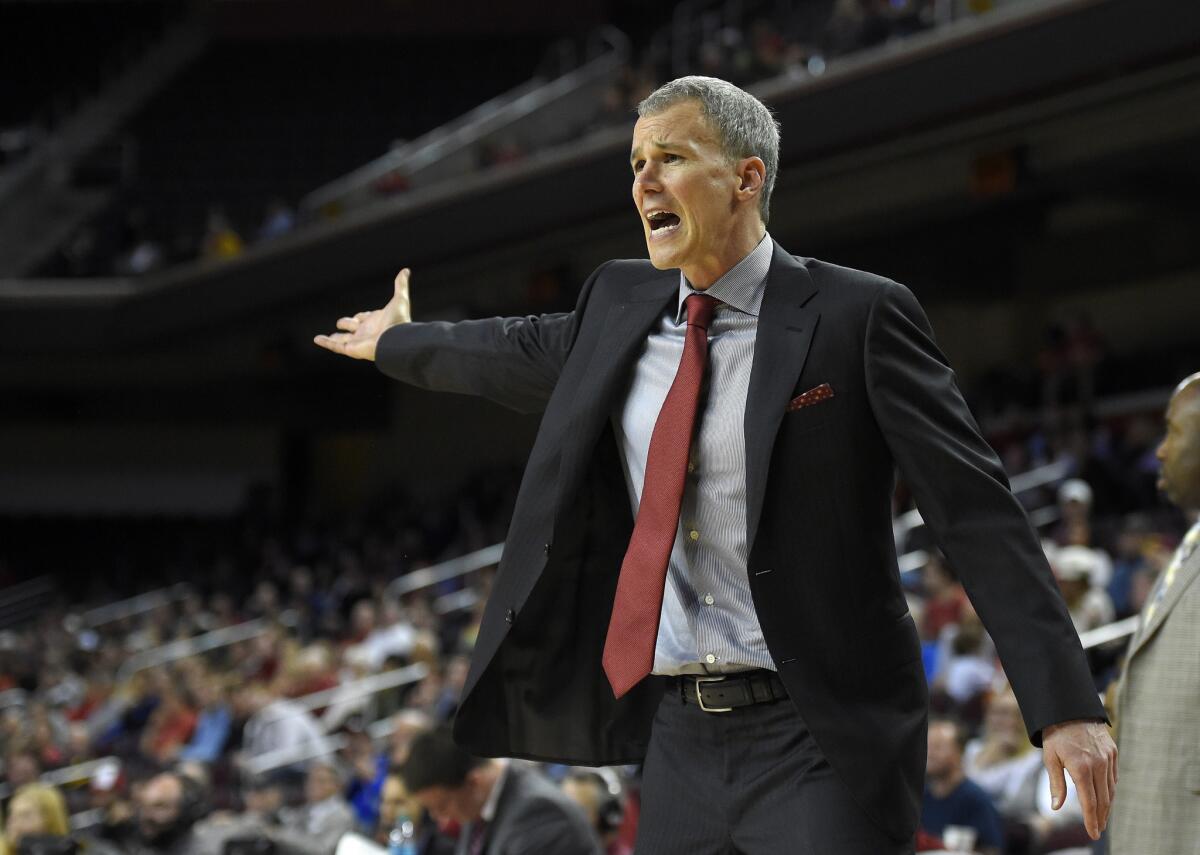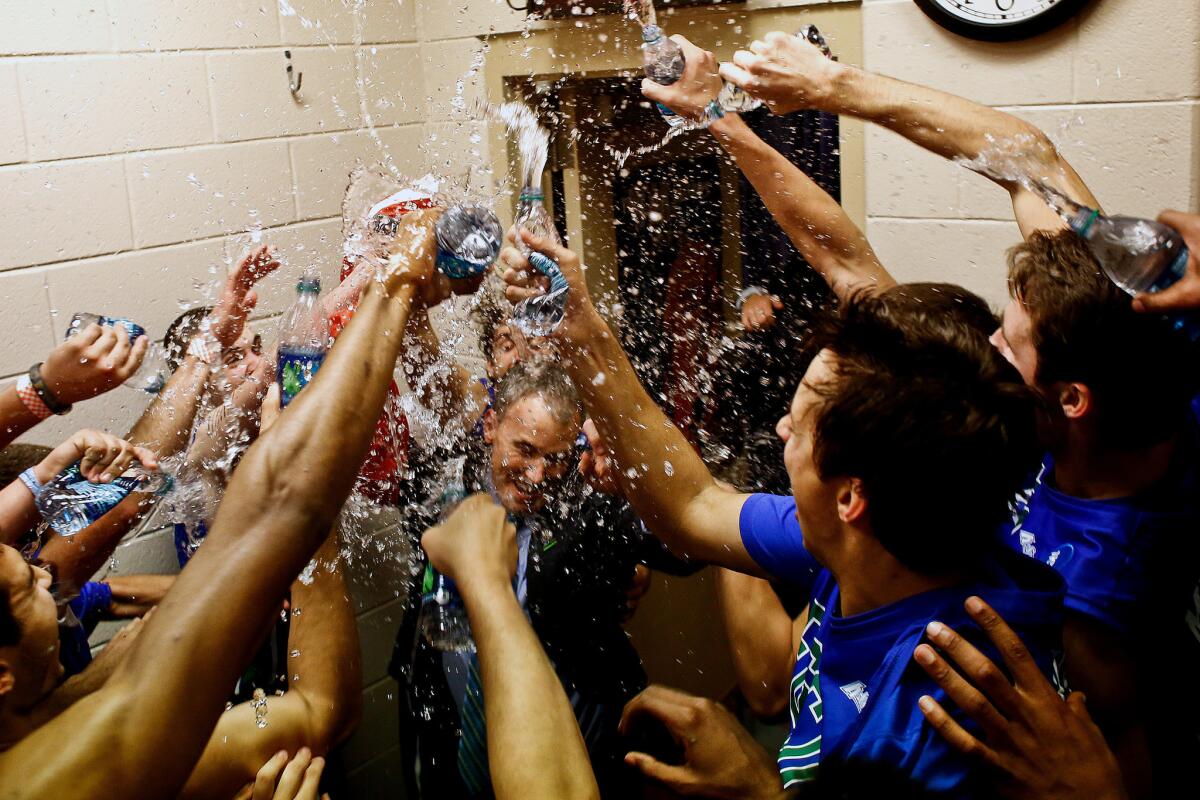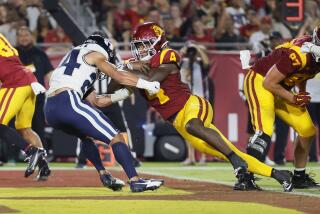Trojans hope to soar like Andy Enfield’s Eagles

USC Coach Andy Enfield yells to his team during the first half of a game against Colorado on Feb. 17.
- Share via
Soaked and smiling, Andy Enfield sat in the trainers room inside Wells Fargo Arena with three of his players and tried to comprehend what had just happened.
It was a Sunday night in Philadelphia, and Florida Gulf Coast had just pulled off one of the most improbable first-weekend runs in NCAA basketball tournament history: the first No. 15 seed to reach a regional semifinal.
Finally, Enfield found words.
“Who would’ve ever thought I’d be sitting here with you three, all of us together, going to a Sweet 16?” he said.
The NCAA tournament can change lives in an instant. Over the course of 72 breathless hours in 2013, the obscure Fort Myers, Fla., university turned into “Dunk City,” with Enfield the coach and architect.
Not long after, USC hired Enfield away, hoping he could re-create the magic in Los Angeles. He’ll have his first chance Thursday when USC plays Providence in an opening round NCAA tournament game in Raleigh, N.C.
Enfield’s blueprint remains simple. The first piece, he said, is the most important — and obvious: “You have to have good players.”
After that: Keep the team loose, but foster a sense of urgency too.
Enfield doesn’t believe a coach can do much more. He can only watch what unfolds.
With Florida Gulf Coast in 2013, most of Enfield’s job was done by the time the team bus rumbled away from the hotel before the Eagles’ first game against No. 2-seeded Georgetown.
The mood was light. Enfield brought his young children for the ride. In the back, the team’s only senior, Sherwood Brown, was dancing.
Ninety minutes later in the locker room, Enfield gathered the team. He was not typically one for speeches. For a week, during practices and film sessions, he’d told his players that they would beat Georgetown — as if No. 15 seeds did that all the time.
He believed players won games, not coaches, so his pregame words were short. He cracked a joke. Then he turned the floor to Brown.
“Let’s not let anyone take this from us,” Brown said. “Are you with me or not?”
Enfield truly believed his players were good enough to win. And it had taken him just two seasons to reach that point.
The season before had been the program’s first in Division I and Enfield brought in five new recruits. Because Florida Gulf Coast was never going to land a blue-chip recruit, the coach looked for only two things:

Florida Gulf Coast players shower Coach Andy Enfield with water in the team’s locker room after advancing to the Sweet 16 with a win over San Diego State in the 2013 NCAA tournament.
“What’s your primary scoring move and what’s your secondary scoring move?” said Michael Estes, a longtime Florida Gulf Coast administrator. “That’s it.”
Enfield would work with that and develop the rest. For most, their repertoire consisted of shooting three-pointers and lobbing alley-oops. Add some bravado, a dash of experience and voila — Dunk City.
(At USC, Enfield didn’t have time to cobble together a recruiting class his first season. That, he said, is why USC took three seasons to make the tournament instead of two.)
Enfield’s offensive philosophy values freedom. Players have wide discretion.
“He just let us be us,” forward Eric McKnight said.
Against Georgetown, it paid off.
Brett Comer, the point guard, liked to improvise, and Enfield let him dictate the offense’s style. Comer said he knew he could take risks, throw passes that bordered on reckless.
“Enfield really hated when Brett passed the ball crazy like that,” guard Bernard Thompson recalled, “but he didn’t do anything because that was Brett’s game.”
A key play toward the end of the Georgetown game provided an example. Up by seven points, Comer dribbled in transition near the basket. Thirty seconds remained on the shot clock. Common sense called for letting the clock wind down.
Instead, Comer flipped a no-look lob toward the rim.
“Every coach in America is saying, ‘Why did you make that pass?’” recalled Martin Richter, an assistant coach. “And we were saying the same thing.”
But a sprinting Chase Fieler got to the rim just in time and slammed the ball down with one hand. The crowd erupted, and the Eagles went on to a 78-68 upset.
During the postgame news conference, a reporter asked Enfield about the play. “Would I recommend that pass?” Enfield said. “No.”
A short time later, the coach walked into his team’s locker room and announced, “We’ve got a game on Sunday. Then we’re going to the Sweet 16.”
He had that kind of confidence in his players, on and off the court.
“See, I coached in the NBA before college,” Enfield said. “When you coach in the NBA, you realize quickly it’s all about the players.”
When the team was on the road, Florida Gulf Coast players were free to roam, so long as they were back by curfew.
Next up was seventh-seeded San Diego State, and on the day between games, some of the Eagles visited Philadelphia’s famous Reading Terminal Market. Others stopped for cheesesteaks. All were hounded for autographs and photographs. “We were only second to Rocky in Philadelphia at that point,” Estes said.
In the locker room before the San Diego State game, Enfield predicted the Eagles would be up by six or eight points late in the game. So please mind your turnovers, he advised.
But when the game began, his team was listless. At halftime, Enfield pulled up a chair and sat down.
The coach didn’t light into his team often, but when he did the listened. And they got an earful.
He’d done this once before. Partway into a disorganized shoot-around a couple of weeks before, Enfield had unleashed a string of expletives so intense that his wife ushered their children out of the gym with hands over their ears.
When the second half began, FGCU overwhelmed San Diego State and won by 10 points.
After the game, the team bounded in the locker room, but the celebration didn’t start in earnest until Enfield joined them.
They grabbed cups, filled them with water, and when their coach finally appeared, soaked him. One player put Enfield in a bear hug and lifted him into the air, the coach beaming as the players chanted his name.
The dream ended in the next game against Florida, but history had been made.
“You really have to look at what Florida Gulf Coast was before that game, and where all the players were before that game,” Comer explained. Enfield had brought “a whole bunch of ‘Bad News Bears’ guys together and built a team that had the ultimate confidence and cared about each other more than any other team I’ve seen. We were so connected. And we all kind of felt that was because of Andy.”
Comer said he watched USC this season as much as possible. He sees similarities: the fast, free-form style, the dunks, the way the players take leadership roles
Maybe, he said, the Trojans can do some damage in the tournament.
“But nobody,” he added, “is Dunk City besides my sophomore-year team.”
More to Read
Fight on! Are you a true Trojans fan?
Get our Times of Troy newsletter for USC insights, news and much more.
You may occasionally receive promotional content from the Los Angeles Times.







